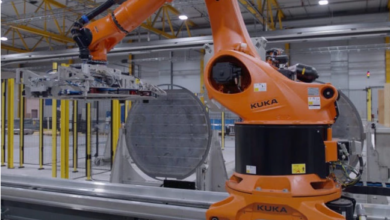Thyssenkrupp provides details on hydrogen projects
Thyssenkrupp can represent the entire value chain for green chemicals through H2Giga, H2Mare and TransHyDE.

The German Federal Ministry of Education and Research (BMBF) will support Thyssenkrupp in the three hydrogen lead projects: H2Giga, H2Mare and TransHyDE.
The three projects will bundle the expertise for hydrogen technologies in science, industry and civil society throughout Germany and kick start the development, conception and implementation of hydrogen solutions on an industrial scale.
Martina Merz, Chairwoman of the Executive Board of thyssenkrupp AG. “Bringing together this strength of our innovation-driven long-standing company with scientific research in the hydrogen flagship projects is the recipe for success for the implementation of the National Hydrogen Strategy and for keeping Germany’s technology leadership competitive internationally.”
H2Giga
The project is driving forward the industrialisation of alkaline water electrolysis through automated series production. Thyssenkrupp will be receiving almost € 8.5 million in subsidies for the R&D of the large-scale production of alkaline water electrolysis (AWE). The Thyssenkrupp-led H2Giga project ‘Install AWE’ focuses on the industrialisation of AWE.
The aim is to take advantage of scaling effects to reduce manufacturing costs. It will also expand the existing supply chain of 1 GW of electrolysis cells enables larger project volumes to be implemented so that several gigawatt projects can be implemented in a consecutive year. A completely new stack and cell development work is being carried out to develop the next technology generation of alkaline electrolysis.
The modular and standardised 20 MW module from Thyssenkrupp is also advantageous in economic aspects and climate protection. In contrast to the compact construction of PEM electrolysers, the single-element technology used for AWE enables selective maintenance work to be carried out on individual cells instead of replacing the entire stack. This conserves resources and reduces operating costs. Thyssenkrupp has partnered with De Nora (a specialist in electrochemistry and high-quality supplier for cell manufacturing and coatings) for the ramp-up to series production. It will also be collaborating with Hoedtke GmbH & Co. KG, as well as scientific partners.
H2Mare
Thyssenkrupp will receive funding of €780,000 in the H2Mare ‘PtX-Wind’ project to develop hydrogen and downstream products such as synthetic fuels, methanol, ammonia and synthetic methane on the high seas.
Thyssenkrupp can offer various integrated green value chains based on its water electrolysis technology, including processes for producing sustainable ammonia, methanol and synthetic natural gas (SNG). In countries with a high potential for hydrogen production due to a good supply of solar and wind power, for example, Australia or Chile, green ammonia is superior to green hydrogen as an energy carrier destined for export. Low and transport costs and the potential large offshore wind farm capacity can help reduce the selling prices and makes green ammonia more competitive as an energy carrier.
TransHyDE
TransHyDE project involves hydrogen transport and conversion technologies such as ammonia cracking. Over long distances, in particular, the transportation of ammonia as a hydrogen carrier is more profitable. After the transportation of green ammonia and its conversion back from liquid ammonia into its constituents hydrogen and nitrogen at locations where hydrogen is required, the hydrogen produced in this way can be put to direct use. It will use Uhde’s extensive expertise in the field of ammonia synthesis.
